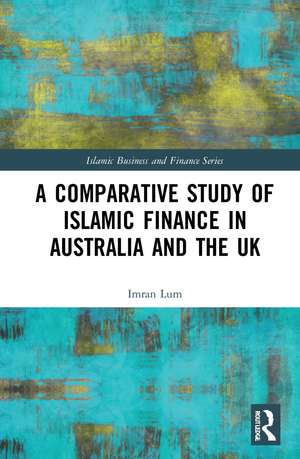A Comparative Study of Islamic Finance in Australia and the UK: Islamic Business and Finance Series
Autor Imran Lumen Limba Engleză Hardback – 29 sep 2021
There is little debate in the Islamic tradition on the prohibition of ribā. The differences, however, lie in the interpretation of ribā and the question of how Muslims live in a society that is heavily reliant on interest and conventional banking, yet at the same time adhere to Islamic guidelines. Through the words of religious leaders, Muslim professionals and university students, Imran Lum provides real accounts of how Muslims in Australia and the UK practically deal with conventional banking and finance products such as home loans, savings accounts and credit cards. He also explores Muslim attitudes towards Islamic finance and queries whether religion is the sole determining factor when it comes to its uptake.
Drawing on his own unique experience as a practitioner responsible for growing an Islamic business in a conventional bank, Lum provides a firsthand account of the complexities associated with structuring Islamic finance products that are not only sharia compliant but also competitive in a non-Muslim jurisdiction. Using ṣukūk bonds as a case study, he highlights the tangible and non-tangible barriers to product development, such as tax and regulatory requirements and the rise of Islamophobia. Combining academic and industry experience, Lum unpacks the relationship of Islamic finance with Muslim identity construction in the West and how certain modalities of religiosity can lead to an uptake of Islamic finance, while others can lead to its rejection.
| Toate formatele și edițiile | Preț | Express |
|---|---|---|
| Paperback (1) | 388.68 lei 6-8 săpt. | |
| Taylor & Francis – 31 mai 2023 | 388.68 lei 6-8 săpt. | |
| Hardback (1) | 1000.27 lei 6-8 săpt. | |
| Taylor & Francis – 29 sep 2021 | 1000.27 lei 6-8 săpt. |
Din seria Islamic Business and Finance Series
-
 Preț: 325.77 lei
Preț: 325.77 lei -
 Preț: 326.49 lei
Preț: 326.49 lei -
 Preț: 309.60 lei
Preț: 309.60 lei -
 Preț: 280.32 lei
Preț: 280.32 lei -
 Preț: 308.97 lei
Preț: 308.97 lei -
 Preț: 311.41 lei
Preț: 311.41 lei -
 Preț: 311.56 lei
Preț: 311.56 lei -
 Preț: 382.57 lei
Preț: 382.57 lei - 16%
 Preț: 222.32 lei
Preț: 222.32 lei -
 Preț: 388.68 lei
Preț: 388.68 lei -
 Preț: 409.47 lei
Preț: 409.47 lei - 18%
 Preț: 1003.89 lei
Preț: 1003.89 lei - 18%
 Preț: 1001.21 lei
Preț: 1001.21 lei -
 Preț: 386.22 lei
Preț: 386.22 lei - 16%
 Preț: 130.21 lei
Preț: 130.21 lei -
 Preț: 324.25 lei
Preț: 324.25 lei - 17%
 Preț: 256.87 lei
Preț: 256.87 lei -
 Preț: 379.09 lei
Preț: 379.09 lei -
 Preț: 386.39 lei
Preț: 386.39 lei - 18%
 Preț: 1007.82 lei
Preț: 1007.82 lei - 26%
 Preț: 762.32 lei
Preț: 762.32 lei - 18%
 Preț: 1003.30 lei
Preț: 1003.30 lei - 18%
 Preț: 996.79 lei
Preț: 996.79 lei - 16%
 Preț: 261.14 lei
Preț: 261.14 lei -
 Preț: 332.60 lei
Preț: 332.60 lei - 9%
 Preț: 934.73 lei
Preț: 934.73 lei - 18%
 Preț: 998.71 lei
Preț: 998.71 lei - 18%
 Preț: 1002.32 lei
Preț: 1002.32 lei -
 Preț: 393.90 lei
Preț: 393.90 lei - 18%
 Preț: 996.33 lei
Preț: 996.33 lei - 25%
 Preț: 771.17 lei
Preț: 771.17 lei - 25%
 Preț: 654.89 lei
Preț: 654.89 lei - 18%
 Preț: 1007.48 lei
Preț: 1007.48 lei - 18%
 Preț: 1000.27 lei
Preț: 1000.27 lei - 18%
 Preț: 1000.27 lei
Preț: 1000.27 lei - 18%
 Preț: 1000.27 lei
Preț: 1000.27 lei - 16%
 Preț: 262.55 lei
Preț: 262.55 lei - 18%
 Preț: 995.99 lei
Preț: 995.99 lei
Preț: 1000.27 lei
Preț vechi: 1219.84 lei
-18% Nou
Puncte Express: 1500
Preț estimativ în valută:
191.40€ • 197.46$ • 159.73£
191.40€ • 197.46$ • 159.73£
Carte tipărită la comandă
Livrare economică 27 martie-10 aprilie
Preluare comenzi: 021 569.72.76
Specificații
ISBN-13: 9780367271077
ISBN-10: 0367271079
Pagini: 296
Dimensiuni: 156 x 234 x 18 mm
Greutate: 0.45 kg
Ediția:1
Editura: Taylor & Francis
Colecția Routledge
Seria Islamic Business and Finance Series
Locul publicării:Oxford, United Kingdom
ISBN-10: 0367271079
Pagini: 296
Dimensiuni: 156 x 234 x 18 mm
Greutate: 0.45 kg
Ediția:1
Editura: Taylor & Francis
Colecția Routledge
Seria Islamic Business and Finance Series
Locul publicării:Oxford, United Kingdom
Public țintă
Postgraduate and UndergraduateNotă biografică
Imran Lum is a Director of Islamic Finance at a major Australian bank and has worked on Islamic finance product development for over 10 years. He was appointed by the Foreign Minister to the Board of the Australia-ASEAN Council, Department of Foreign Affairs and Trade. Imran was ranked in the top 500 who make the Islamic Economy by ISLAMICA 500 for three years (2017–2019), and he was the 2019 Corporate Winner for the 40 Under 40 Most Influential Asian-Australians. Imran has a PhD in Islamic Studies from the University of Melbourne.
Cuprins
1. Introduction 2. Research methodology 3. Religious leaders’ interpretation of ribā and attitudes towards home loans, savings accounts and credit cards 4. Muslim professionals and university students’ interpretation of ribā and attitudes towards home loans, savings accounts and credit cards 5. Islamic banking and finance in Australia and the UK 6. Challenges of structuring Islamic finance products in Australia: a case study on ṣukūk bonds 7. Islamic banking and finance and identity 8. Islamic banking and finance and religiosity 9. Conclusion 10. Bibliography
Descriere
This book provides valuable insights into the practical challenges faced by the nascent Islamic finance industry and compares the Australian experience to developments in the UK.
